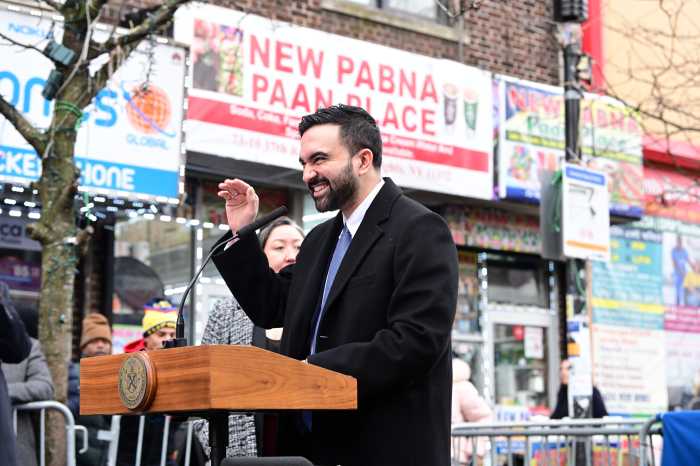Robert Mitchell adapts film classic to an earnestly simple stage
My, how Boris Karloff has changed. He no longer has all those seams and stitches and mismatched patchworks all over his face. He no longer, in fact, has a rectangular, stony-eyed, chopping-block head, but more a handsome, sensitive, slim-chin one. Suntanned. His legs and arms no longer clunk like trunks of trees. He moves like a cat, as somebody says. And, though he is quite big, he no longer is huge.
His name now is Timothy Warmen. That’s the actor’s name. He’s no longer referred to, anywhere, first to last, as The Monster. He’s just The Creature. A being of some sort—well, a construct—with a sad yet not altogether unhappy human-interest story. Murder, yes. Death, yes. A hanged girl and other divagations. But, at root, a story of Uplift. Washed all over and under with song. Forty songs, to be exact.
Thus “Frankenstein: The Musical,” at the Wings Theatre on Christopher Street, where a packed house at last Sunday’s matinee—not one empty seat—applauded each of those 40 numbers as if nobody had ever seen James Whale’s semi-immortal 1931 movie, or as if they had seen that epic and agreed with the Internet critic who feels “the film shows its age, particularly in the absence of a musical score.”
Well, now there is one, thanks to Robert Mitchell, composer, lyricist, and book writer of the present effort and of the “Vincent”—van Gogh, that is—that preceded it here three years ago.
Let me first say that the staging of this “Frankenstein,” by John Henry Davis—with musical staging and directing by Haila Strauss and Paul Staroba—however modest, with a tiny cast of five playing two or three times that many roles (sometimes to my confusion) is one of its principal assets. They not only act and sing, they’re continually shifting a “scenery” of silver-paper screens, devised by Court Watson, in a sort of nonstop choreography. Victor Frankenstein’s entire lab, for openers, is a tabletop bearing a goblet or two.
Victor Frankenstein himself, gray vest, bow tie, constipated face, and all—the picture of pinched neatness—is Brian Charles Rooney, last seen in these parts (okay, Broadway) as Lucy Brown in Scott Elliott’s misbegotten “Threepenny Opera.” Here Rooney is very sincere, very strained (it’s not easy, creating Creatures), very guilty about a lot of things including the death (not his fault) of his mama and (maybe his fault) of his kid brother.
That kid brother and a number of other people are played by Martin Giannini. Papa and a number of other people—notably the blind man whose hut is entered by the lonely, wandering Creature—is Paul Jackel, who has a tendency toward the orotund and oratorical. “I don’t know where I came from,” sobs the Creature, clutching the stolen book from which he has learned to read. “Is there another creation such as me? I am wretched, Sir.”
In short, an identity crisis.
The blind man opens his arms. “Let us embrace,” he cries. “Are we not all creatures of the same knowing father!” And all along, the Creature had looked upon Victor Frankenstein as his father. So had Frankenstein. Ah, irony, “Father to me!” the Creature has indeed cried to Victor. “Am I not your creation? Your Adam in the Garden? But where is my Eve?”
Aha! The plot tightens. As does the rope around the neck of the hanged girl (Kim Volpe) who will in short order become that Eve, the (dead) bride of the undead Creature who sings to her, tenderly, inspiringly, as she flops in his arms, “Arise, arise!”
There will be a reprise of that number, with a twist, not long hence—but first, a more vengeful turn of events. Victor Frankenstein, acquitted of murder—don’t ask me to explain—has a bride of his own, the fair Elizabeth. She is waiting for him, on their wedding night, in bed—an upright sheet against one of those tinfoil screens—when the Creature bursts in and takes her (by implication) from behind. Takes her and impregnates her. “Frankenstein: The Musical” is nothing if not Fraught. A drama of Fraught Fathers.
What repays not just Victor but the onlooker out in the seats is that this Elizabeth—an actress named Cadden Jones—is a young woman with I think a pleasant voice (as much as I could hear of it or of anybody over the booming amplified keyboard) and one of the loveliest smiles in the world; what once upon a time was called a come-hither smile.
It does her no good now. Victor dies, and is clutched at final curtain in the very same arms of the very same Creature who is singing the very same “Arise! Arise!” as—to another gender—some minutes earlier. It is the only moment in the whole show when I felt the wings of man-on-man tenderness brushing over the Wings Theatre.
gaycitynews.com


































